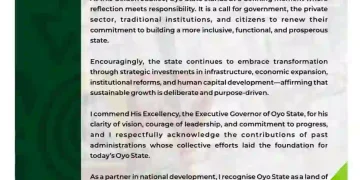“Eniyan ti ko le gbe omi, ko gbodo gun oke omi” — He who cannot carry water should not climb a hill with a pot. Yet here we are, watching Governor Dapo Abiodun attempt to climb the steepest political mountain with the most fragile vessel imaginable: the appointment of 1,200 Personal Assistants in what can only be described as the twilight fumbling of a man desperately trying to polish his legacy with fool’s gold.
As the curtains prepare to fall on the Abiodun administration, one cannot help but marvel at this spectacular display of political theater. Like a magician whose tricks have been exposed, the governor waves his wand one final time, hoping to conjure applause from an audience that has long since seen through the smoke and mirrors. The appointment of 1,200 assistants is not governance—it is the political equivalent of a drowning man grasping at straws while calling it swimming.
In the cold light of analysis, this mass appointment reeks of everything wrong with twilight governance. It is the handiwork of an administration that, having failed to plant trees that would bear fruit for generations, now scrambles to distribute seeds in the final hour, hoping posterity will mistake scattered promises for a harvested legacy.
What exactly will these 1,200 assistants assist with? The question hangs in the air like incense in an empty cathedral, fragrant but ultimately purposeless. In the absence of clear job descriptions, measurable deliverables, or sustainable impact frameworks, this policy reads more like a political census than a governance strategy. It is bureaucracy gone mad, administration by multiplication, and leadership by committee, a recipe for chaos masquerading as compassion.
Political Sedation
Governor Abiodun’s defenders will argue that this initiative provides succour to families, that each appointee supports ten dependents, and that it injects life into local economies. This argument, while emotionally appealing, is psychologically naive. By conditioning citizens to depend on government stipends rather than empowering them with skills and sustainable opportunities, the administration is not solving poverty, it is institutionalising it.
This is the classic mistake of feeding people fish while keeping the fishing rods locked away in government warehouses. When these appointments expire—and they inevitably will—what becomes of the families who restructured their lives around these temporary allowances? The governor may sleep well tonight knowing he has temporarily filled some pots, but tomorrow’s empty stomachs will curse today’s short-sighted generosity.
Perhaps the most damning indictment of this policy is its opportunity cost. The resources being channelled into 1,200 monthly stipends could have completed abandoned school projects, equipped hospitals with life-saving equipment, built roads that connect communities to opportunities, or funded entrepreneurship programs that create jobs rather than dependents.
Instead, Ogun State gets a bloated bureaucracy that will consume resources without producing measurable outcomes. It is governance by addition rather than multiplication, creating positions instead of possibilities, appointments instead of achievements. The mathematics of development demands that public investment should multiply impact, not merely distribute it thinly across political constituencies.
This mass appointment reveals the administration’s fundamental misunderstanding of 21st-century governance. In an era where progressive governments are leveraging technology to streamline operations, Ogun State is adding 1,200 more layers to an already complex administrative structure. It is like trying to improve internet speed by adding more cables instead of upgrading the network infrastructure.
The psychology of patronage politics is seductive but ultimately destructive. It creates a culture of dependency where citizens see government not as a platform for empowerment but as a source of handouts. It transforms voters into supplicants, entrepreneurs into job-seekers, and innovators into appointment-waiters. This is not the foundation upon which great states are built.
As Governor Abiodun prepares to exit the stage, this policy stands as a metaphor for his entire approach to governance—well-intentioned but poorly conceived, emotionally appealing but strategically bankrupt, politically expedient but developmentally counterproductive. It is a castle built on sand, destined to collapse when the first economic storm arrives.
The tragedy is not just in the policy itself but in what it represents: a missed opportunity to leave Ogun State stronger, more capable, and better positioned for sustainable growth. Instead of building institutions that outlast administrations, we get initiatives that barely outlast newspaper headlines.
The Path Not Taken
Ogun State deserved better from its twilight governor. It deserved policies that would have made 1,200 entrepreneurs, not 1,200 assistants. It deserved investments in technical education that would have produced skilled workers for a modern economy, not additions to an already bloated civil service. It deserved infrastructure that would have attracted investors, not expenditures that would have impressed voters.
The appointment of 1,200 assistants will be remembered not as Dapo Abiodun’s masterstroke but as his political swan song—beautiful in its ambition, tragic in its execution, and ultimately futile in its impact. It is the final act of a governor who, having failed to move mountains, settles for rearranging pebbles.
Future historians studying this administration will note this policy as the moment when potential finally surrendered to politics, when development gave way to distribution, and when a governor’s legacy was reduced to the sum of his appointments rather than the substance of his achievements.
“Eniyan ti ko le gbe omi, ko gbodo gun oke omi.” Governor Abiodun has climbed his hill. The pot has shattered. The water has spilt. And Ogun State is left to clean up the mess.
This feature reflects the opinion of the writer and not necessarily that of this publication.
Oluwaseun Adetola writes from Ijebu Ode.





















